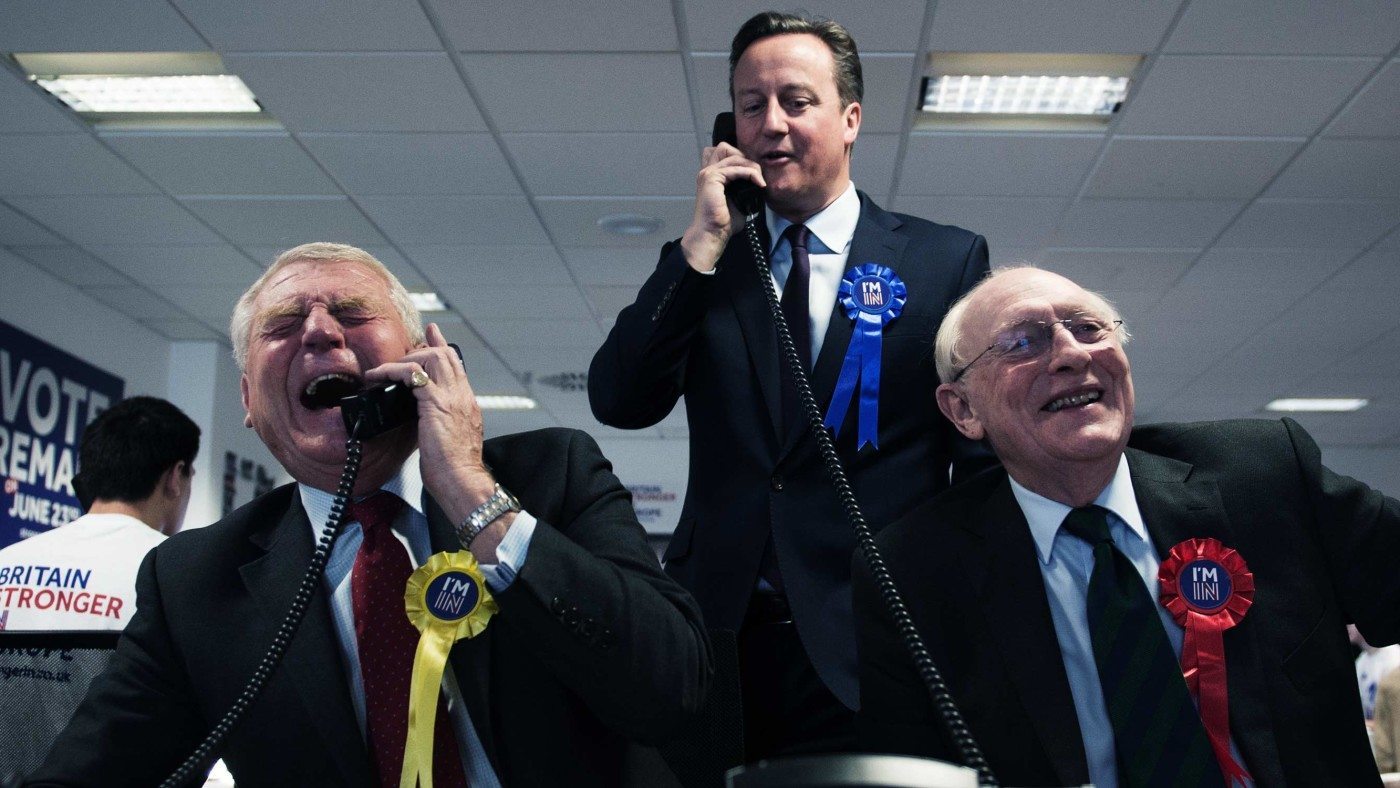This is the weekly newsletter from CapX. To receive it by email every Friday, along with a short daily email of our top five stories, please subscribe here.
It’s a photo that will be republished for many years to come. Three long-time political opponents – David Cameron, Paddy Ashdown and Neil Kinnock – sat alongside each other at a phone bank, calling unsuspecting voters and urging them to stay in the EU. But it’s not the unlikeliest alliance that the prime minister is forging as part of his increasingly desperate attempt to prevent Brexit from happening. The Cameron-Corbyn alliance wins that accolade. The PM needs the Labour leader to persuade left-leaning voters not to use June’s EU referendum as a way of punishing the Conservatives for the death sentence hanging over Port Talbot, George Osborne’s botched attempt to cut disability benefits, the junior doctors’ dispute or the fallout from Panama.
Mr Corbyn, seven weeks after the referendum date was set, didn’t exactly rush to nail his red colours to the EU mast but, yesterday, he finally did. And it wasn’t always obvious that he would. Only a few months ago, during Labour’s leadership election, he openly contemplated backing Out and, if he had, it would have been consistent with his whole parliamentary career. He voted against joining the EEC in the 1970s, in the 1990s he voted against the Maastricht Treaty. A decade ago he voted against the Lisbon Treaty. He has opposed the euro, the current trade talks with America and has always complained about the EU’s lack of democracy. But, yesterday, in a sign that his new, straight-talking politics was a lot like the old, compromising politics he threw aside his Tony Bennite objections to the European bureaucracy. Outside of the EU, he warned, the Tories would be able to shred worker protections, boil babies alive and send children up chimneys – or something bloodcurdling like that. Or, to translate, he was basically arguing that outside of the EU the democratically-elected government of the British people would no longer be subservient to unelected or unaccountable European bureaucrats, judges, central bankers and commissioners but free to do what it promised in its manifesto. Corbyn’s argument might persuade left-wingers to back the EU but it’s not the highest minded or most democratic of arguments. That rolling around sound is, I suspect, coming from inside Tony Benn’s grave.
The Cameron-Corbyn-Ashdown-Kinnock-IMF-Goldmans-CBI… and soon-to-be-Obama chorus means the fearmongering Remain campaign has probably had its best week since the campaign began and underlines the uphill struggle that Brexiteers face. Unless there is a low turnout, which would favour Leave because of the enthusiasm premium among its supporters, the usual drift of undecided voters towards the status quo will mean Cameron ends his premiership with three referenda victories to his name and one-and-a-half general election wins.
The Vote Leave campaign, now with official designation secured, is still upbeat, however, and is about to start firing its main guns. That began today with the argument that billions of pounds of extra investment could be won for the NHS if we vote to leave and no longer are such large net contributors to the EU budget. £5 billion extra for hospitals each year may not seem like a clincher of an argument when so much else is at stake but it shouldn’t be forgotten that the estimated (even exaggerated) £250 million cost of switching to AV was be of the most potent arguments in the 2011 referendum when Britain voted on changing the electoral system. Not giving money to Johnny Foreigner and instead giving it to nurses and cancer patients might resonate. Matthew Elliott, who ran that 2011 voting machines message and is running the Vote Leave campaign, doesn’t get out of bed in the morning without holding a focus group and running an opinion poll. He will be running this NHS message because he knows that he needs to reach left-wing voters in order to win and that they like it. Leave has a hardcore of immigration-sceptics and sovereignty-enthusiasts already in the bank. Getting left-leaners and younger voters is the big task facing Out.
Boris Johnson will be the key to persuading younger Britons that national self-determination is not outdated. Whereas Britain joined the EEC in the 1970s when it was plagued by destructively powerful unions, industrial decline, the Troubles in Northern Ireland and, in the words of the Wall Street Journal, a sense that it was closing for business, the boot is on the other foot today. Britain is the fastest growing major economy in Europe, London can claim to be the world’s capital, our creative industries are booming. Europe – with devastating levels of youth unemployment across its southern periphery because of the euro project, unable to agree a common refugees policy and losing its share of world trade at an accelerating rate – looks like the past. If the EU’s national leaders weren’t spending so much of their time worrying about Greece and the EU’s other ailments they could, perhaps, be focused on the real needs of their countries. Who, more than Boris, Britain’s most popular politician, is in a better position to sell that message?
Cameron, of course, doesn’t just need to win the referendum. He really needs to win it well if his party doesn’t invite him, very quickly, to spend more time with his tax returns. There is fury throughout the grassroots and among many of his MPs at the £9m pro-EU leaflet that he ordered in defiance of, says the Electoral Commission, the spirit of the referendum rules. The leaflet captures the wide sense that with his exaggerated fears and tactics, Cameron isn’t playing fair. Without an emphatic victory that sense of we-woz-robbed by Eurosceptics could make post-referendum management of the Tories tricky. Tory Eurosceptics have come to distrust their leader and even resent him. Whatever the result, he will soon be more and more like Messrs Kinnock and Ashdown. An ex-party leader.


